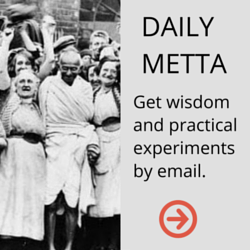May 26:
 “I am a humble explorer of the science of nonviolence.”
“I am a humble explorer of the science of nonviolence.”
–Gandhi (Young India, November 20, 1924)
Nonviolence: it’s a strategy for some, a moral imperative for others, a way of life for some more, but mainly for Gandhi, it was a science. Understanding that the fundamental basis of science is the spirit of hypothesis and experimentation, he took upon himself great challenges with the detachment needed to understand what went wrong, what to adjust and how to replicate the experiment when needed. Even further, like a good scientist, he was aware that “the instrument of observation” affected the results of the experiment. For example, if you have a microscope, you will have different results than if you have a telescope. And if you have smudges on either one of these instruments, you will have problems with your findings. Similarly, if the person behind the microscope does not know what they are looking at, they might overlook important findings that a different scientist might understand immediately as the cure to an illness.
So it is in nonviolence: we are the instruments of experimentation and observation. The more resentment in our hearts the more we affect the results of our action. The more relaxed we are in a given situation–even if we are resisting and being firm with someone–we will influence the result of that action. It’s for this reason that some say Gandhi is a “purist,” that you have to be free from normal human reactions to be nonviolent. But like a good scientist he’s not saying you have to be a “pure” soul in order to be nonviolent, only that our states of minds will influence the way we see others, the world, and even the results of our actions, so yes, we need to work on ourselves if we want to deepen our view of the full scope of nonviolent possibilities. It calls to mind St. Francis of Assisi in a whole new light, you know, the whole “Make me an instrument of thy peace” stuff?
Remarkably, Gandhi was talking about the science of nonviolence at a time when science really could not back up his unique form of social research. However, for the past thirty years, science has given us a much more inspiring picture of how nonviolence actually works, from quantum physics to “mirror neurons.”
Experiment in Nonviolence:
Think about the way that you would address someone who really hurt you versus the way you would approach someone who just made you feel happy and loved. How does your approach change, and to what effect?
 Daily Metta 2015, a service of the Metta Center for Nonviolence, is a daily reflection on the strategic and spiritual insights of Mahatma Gandhi in thought, word and deed. As Gandhi called his life an “experiment in truth,” we have included an experiment in nonviolence to accompany each Daily Metta. Check in every day for new inspiration. Each year will be dedicated to another wisdom teacher.
Daily Metta 2015, a service of the Metta Center for Nonviolence, is a daily reflection on the strategic and spiritual insights of Mahatma Gandhi in thought, word and deed. As Gandhi called his life an “experiment in truth,” we have included an experiment in nonviolence to accompany each Daily Metta. Check in every day for new inspiration. Each year will be dedicated to another wisdom teacher.








